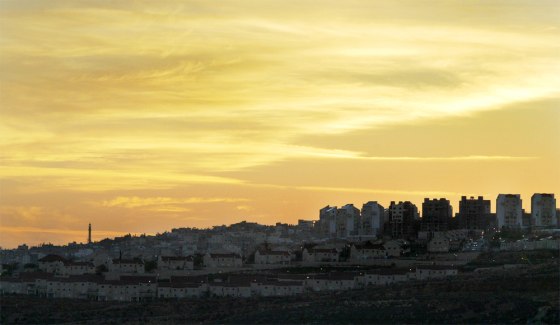The population in the Jewish settlements in the West Bank and Gaza Strip has grown by about 16 percent during the almost three years of Prime Minister Ariel Sharon’s rule, according to Interior Ministry statistics released Tuesday. The statistics emerged on the heels of an Israeli announcement that it would remove four unauthorized settlements, a move decried by prominent Palestinians as a "publicity stunt."
The Israeli statistics show the population of settlements is 236,381 people, up from 203,067 at the end of 2000, three months before Sharon took office.
The Israeli prime minister has traditionally been a champion of settlements established in the areas Israel captured in the 1967 Mideast war.
But in June, Sharon committed to implement the U.S.-backed “road map” peace plan. The plan, stalled by mutual violence, calls for Israel to dismantle all outposts built since March 2001 and freeze construction in 150 larger settlements on land captured from Jordan and Egypt in the 1967 Middle East war.
The road map outlines the establishment of an independent Palestinian state by 2005. Some 3.5 million Palestinians live in the West Bank and Gaza.
The road map also calls on the Palestinians to dismantle militant groups — a move they have so far failed to take.
In a recent policy speech, Sharon said he may dismantle some outlying settlements as part of a unilateral “disengagement” from the Palestinians if progress is not made on the road map. Israel’s announced on Monday a decision to remove four unauthorized settlement outposts.
“The prime minister is determined to fulfil his obligation in terms of personal credibility as well as the credibility of the state of Israel,” Sharon adviser Raanan Gissin told Reuters.
“You are going to see more of this,” he said, referring to the dismantling of unauthorized outposts.
Population in outlying settlements grew faster
The statistics released Tuesday show that the population in the outlying settlements — which tend to attract Israelis motivated more by ideology than economic benefits — grew faster than those in areas closer to the line with Israel.
For example, the Kfar Darom settlement in the Gaza Strip grew by 52 percent during the past three years. Nearby Netzarim grew by 24 percent. The settlement enclaves in the West Bank city of Hebron, where 130,000 Palestinians live, grew by almost 15 percent to 554 residents, the Interior Ministry said.
In contrast, the settlement of Maaleh Adumim, located just a few minutes drive outside of Jerusalem, grew by nine percent.
An official in Sharon’s office said the prime minister remains committed to the road map. The official, speaking on condition of anonymity, said Sharon has not built new settlements, allowing only “natural growth” in existing settlements.
The overall annual growth rate for the nation is 1.8 percent, Israel’s Army Radio said.
Palestinians skeptical
The Palestinian Authority on Monday criticized Israel’s decision to dismantle four outposts, only one of which was inhabited, saying the move was a publicity stunt that falls below the requirements of the U.S.-backed road map.
“I think the world is sick and tired of these public relations stunts -- Israelis moving a caravan here and a caravan there,” Palestinian Negotiating Minister Saeb Erekat told reporters in the West Bank city of Ramallah.
Two members of Prime Minister Ariel Sharon’s cabinet said the Israeli government was moving too slowly in carrying out a commitment to remove dozens of unauthorized settlement outposts from occupied territory.
The ministers spoke on Israel Radio after Sharon signed an order to accelerate the removal of the four outposts -- only one of them inhabited -- in accordance with the road map.
A senior adviser to Sharon said more would be dismantled in the future but gave no date.
Palestinian leader Yasser Arafat appealed to Israel’s security concerns in denouncing the settlement expansion.
“I ask the Israeli side to stop... this settlement assault that will not provide security for the Israelis, because the road to security is through the recognition of our rights,” he said in remarks broadcast on Palestinian television and radio.
"Foot-dragging”
Earlier in the day, Meir Sheetrit, an Israeli minister without portfolio and member of Sharon’s right-wing Likud party, said the government was dragging its feet on the issue.
Justice Minister Yosef Lapid, leader of Shinui, a key coalition partner, added that the unauthorized outposts were “ruining our relations with the Americans, with Europe” and must be taken down.
In a statement, legislators from the far-right National Union party said the decision to remove unauthorized outposts “tramples democratic values, and we will not agree to the uprooting of Jews from their land.”
But the party, which has seven legislators in the 120-member parliament, gave no indication that it might bolt the coalition over the removal of the outposts.
Most of the international community regards settlements as illegal. Israel disputes this.
Israeli newspaper reports named the outposts earmarked for removal as Ginot Aryeh and Shaked Farm, both near the Palestinian city of Ramallah; Magen David in the Hebron area; and West Bat Ayin near Bethlehem.
Jewish settlers have 10 days to appeal to the Supreme Court against the edict, issued on Sunday.
“We will go to the Supreme Court,” said Geula Hershkovits of Ginot Aryeh, named for her husband who was killed by Palestinian militants in January 2001.
Yossi Sarid, a leading left-wing member of parliament, said that at least two of the encampments had been removed in past operations but settlers had rebuilt them.
